Understanding Foucault's Biopower Through China's Cultural Revolution
VerifiedAdded on 2022/11/14
|5
|1375
|380
Essay
AI Summary
This essay provides an overview of Michel Foucault's concept of biopower, defining it as a tactic of power used to manage large human groups by regulating the population and controlling the human body through social disciplinary institutions. It explores the historical transformation of power dynamics, where human life itself became a tool for utilizing power, and the relationship between biopower and biopolitics. The essay then analyzes how the concept of biopower can be applied to the scenario of China's Cultural Revolution, specifically focusing on the government's implementation of birth control policies. It highlights how these policies reflect Foucault's ideas of controlling individual and collective lives through surveillance, institutional discipline, and regulations. The essay concludes by emphasizing the relevance of biopower in understanding social control and power dynamics, drawing upon the provided references for further exploration.
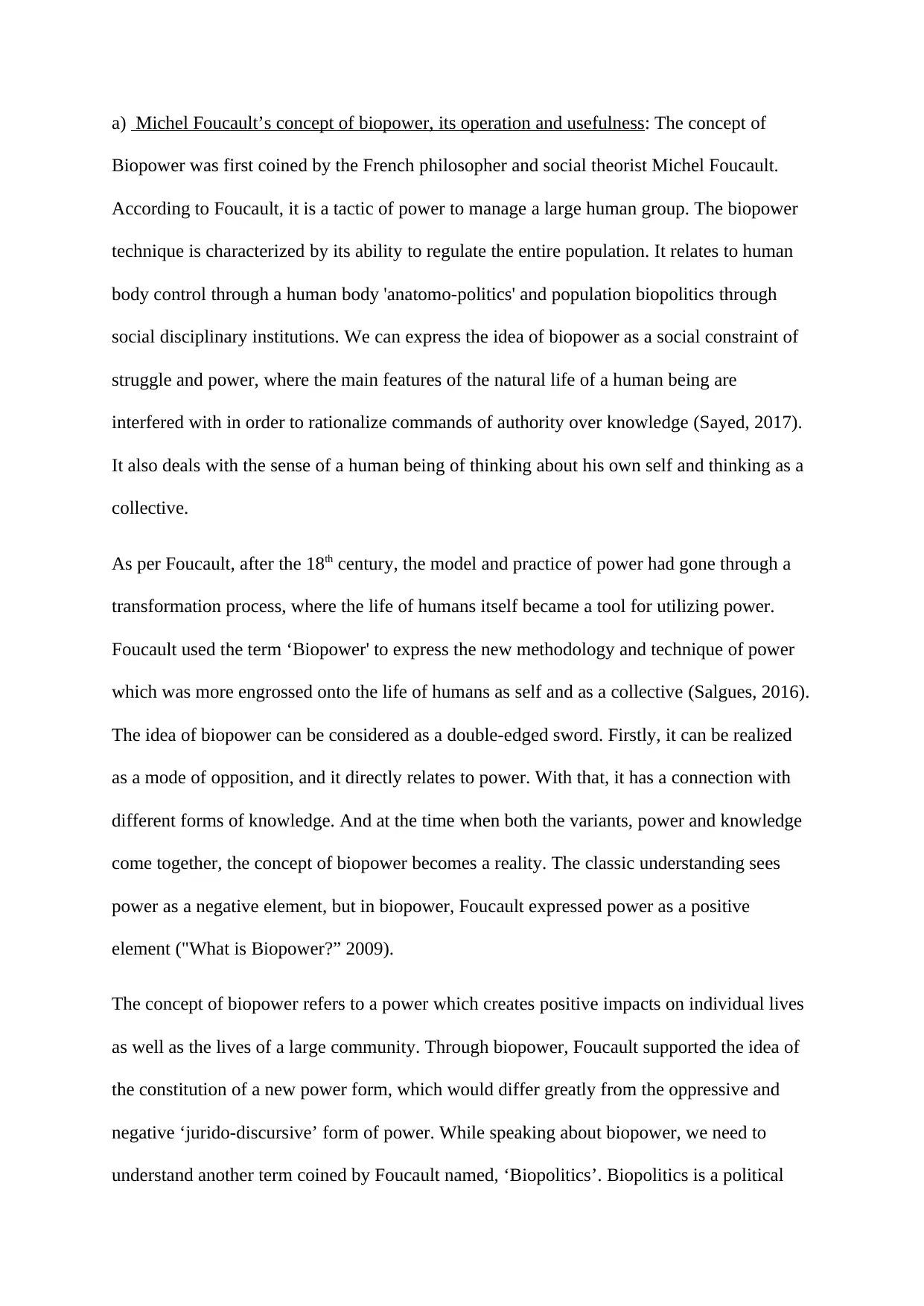
a) Michel Foucault’s concept of biopower, its operation and usefulness: The concept of
Biopower was first coined by the French philosopher and social theorist Michel Foucault.
According to Foucault, it is a tactic of power to manage a large human group. The biopower
technique is characterized by its ability to regulate the entire population. It relates to human
body control through a human body 'anatomo-politics' and population biopolitics through
social disciplinary institutions. We can express the idea of biopower as a social constraint of
struggle and power, where the main features of the natural life of a human being are
interfered with in order to rationalize commands of authority over knowledge (Sayed, 2017).
It also deals with the sense of a human being of thinking about his own self and thinking as a
collective.
As per Foucault, after the 18th century, the model and practice of power had gone through a
transformation process, where the life of humans itself became a tool for utilizing power.
Foucault used the term ‘Biopower' to express the new methodology and technique of power
which was more engrossed onto the life of humans as self and as a collective (Salgues, 2016).
The idea of biopower can be considered as a double-edged sword. Firstly, it can be realized
as a mode of opposition, and it directly relates to power. With that, it has a connection with
different forms of knowledge. And at the time when both the variants, power and knowledge
come together, the concept of biopower becomes a reality. The classic understanding sees
power as a negative element, but in biopower, Foucault expressed power as a positive
element ("What is Biopower?” 2009).
The concept of biopower refers to a power which creates positive impacts on individual lives
as well as the lives of a large community. Through biopower, Foucault supported the idea of
the constitution of a new power form, which would differ greatly from the oppressive and
negative ‘jurido-discursive’ form of power. While speaking about biopower, we need to
understand another term coined by Foucault named, ‘Biopolitics’. Biopolitics is a political
Biopower was first coined by the French philosopher and social theorist Michel Foucault.
According to Foucault, it is a tactic of power to manage a large human group. The biopower
technique is characterized by its ability to regulate the entire population. It relates to human
body control through a human body 'anatomo-politics' and population biopolitics through
social disciplinary institutions. We can express the idea of biopower as a social constraint of
struggle and power, where the main features of the natural life of a human being are
interfered with in order to rationalize commands of authority over knowledge (Sayed, 2017).
It also deals with the sense of a human being of thinking about his own self and thinking as a
collective.
As per Foucault, after the 18th century, the model and practice of power had gone through a
transformation process, where the life of humans itself became a tool for utilizing power.
Foucault used the term ‘Biopower' to express the new methodology and technique of power
which was more engrossed onto the life of humans as self and as a collective (Salgues, 2016).
The idea of biopower can be considered as a double-edged sword. Firstly, it can be realized
as a mode of opposition, and it directly relates to power. With that, it has a connection with
different forms of knowledge. And at the time when both the variants, power and knowledge
come together, the concept of biopower becomes a reality. The classic understanding sees
power as a negative element, but in biopower, Foucault expressed power as a positive
element ("What is Biopower?” 2009).
The concept of biopower refers to a power which creates positive impacts on individual lives
as well as the lives of a large community. Through biopower, Foucault supported the idea of
the constitution of a new power form, which would differ greatly from the oppressive and
negative ‘jurido-discursive’ form of power. While speaking about biopower, we need to
understand another term coined by Foucault named, ‘Biopolitics’. Biopolitics is a political
Paraphrase This Document
Need a fresh take? Get an instant paraphrase of this document with our AI Paraphraser
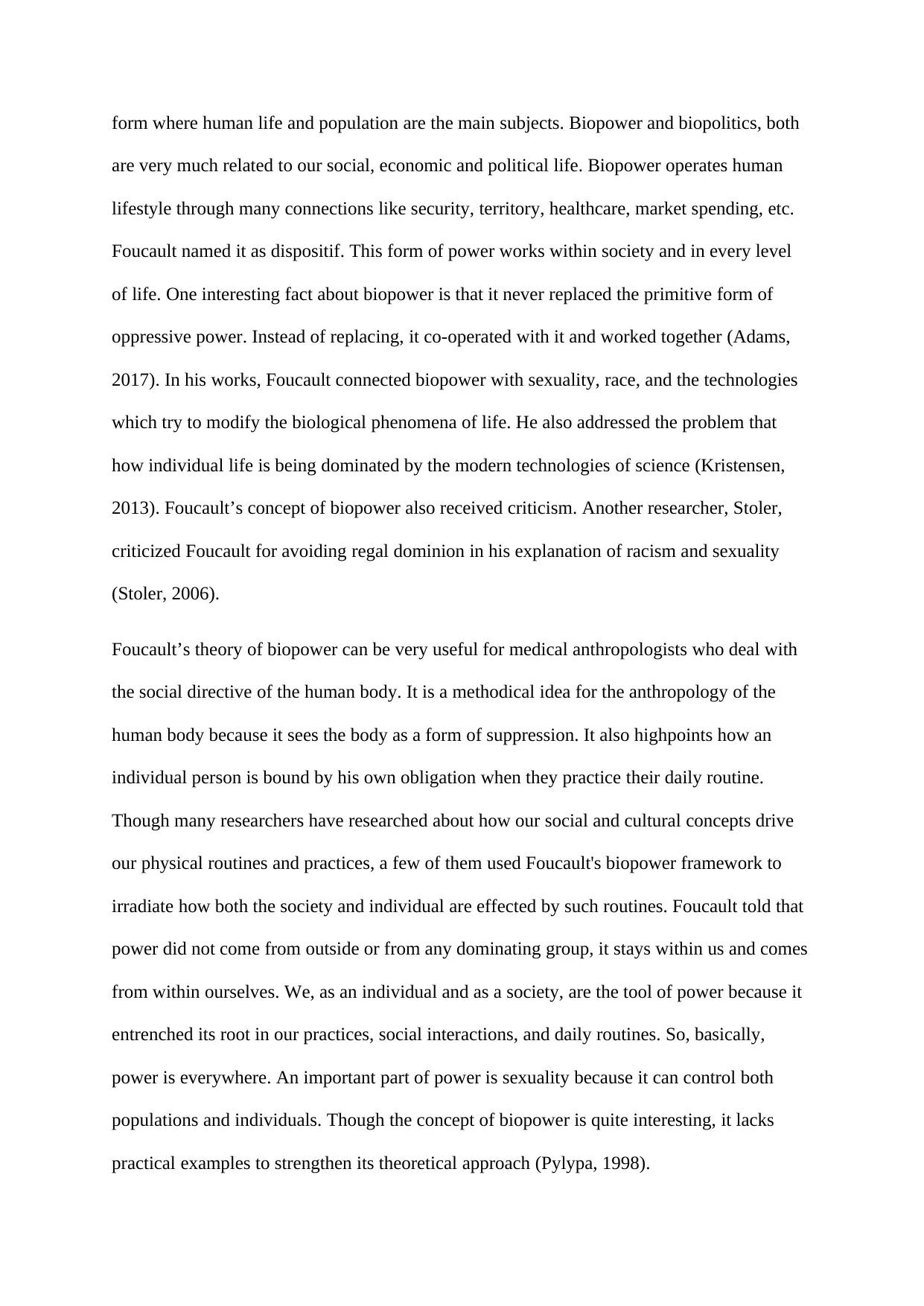
form where human life and population are the main subjects. Biopower and biopolitics, both
are very much related to our social, economic and political life. Biopower operates human
lifestyle through many connections like security, territory, healthcare, market spending, etc.
Foucault named it as dispositif. This form of power works within society and in every level
of life. One interesting fact about biopower is that it never replaced the primitive form of
oppressive power. Instead of replacing, it co-operated with it and worked together (Adams,
2017). In his works, Foucault connected biopower with sexuality, race, and the technologies
which try to modify the biological phenomena of life. He also addressed the problem that
how individual life is being dominated by the modern technologies of science (Kristensen,
2013). Foucault’s concept of biopower also received criticism. Another researcher, Stoler,
criticized Foucault for avoiding regal dominion in his explanation of racism and sexuality
(Stoler, 2006).
Foucault’s theory of biopower can be very useful for medical anthropologists who deal with
the social directive of the human body. It is a methodical idea for the anthropology of the
human body because it sees the body as a form of suppression. It also highpoints how an
individual person is bound by his own obligation when they practice their daily routine.
Though many researchers have researched about how our social and cultural concepts drive
our physical routines and practices, a few of them used Foucault's biopower framework to
irradiate how both the society and individual are effected by such routines. Foucault told that
power did not come from outside or from any dominating group, it stays within us and comes
from within ourselves. We, as an individual and as a society, are the tool of power because it
entrenched its root in our practices, social interactions, and daily routines. So, basically,
power is everywhere. An important part of power is sexuality because it can control both
populations and individuals. Though the concept of biopower is quite interesting, it lacks
practical examples to strengthen its theoretical approach (Pylypa, 1998).
are very much related to our social, economic and political life. Biopower operates human
lifestyle through many connections like security, territory, healthcare, market spending, etc.
Foucault named it as dispositif. This form of power works within society and in every level
of life. One interesting fact about biopower is that it never replaced the primitive form of
oppressive power. Instead of replacing, it co-operated with it and worked together (Adams,
2017). In his works, Foucault connected biopower with sexuality, race, and the technologies
which try to modify the biological phenomena of life. He also addressed the problem that
how individual life is being dominated by the modern technologies of science (Kristensen,
2013). Foucault’s concept of biopower also received criticism. Another researcher, Stoler,
criticized Foucault for avoiding regal dominion in his explanation of racism and sexuality
(Stoler, 2006).
Foucault’s theory of biopower can be very useful for medical anthropologists who deal with
the social directive of the human body. It is a methodical idea for the anthropology of the
human body because it sees the body as a form of suppression. It also highpoints how an
individual person is bound by his own obligation when they practice their daily routine.
Though many researchers have researched about how our social and cultural concepts drive
our physical routines and practices, a few of them used Foucault's biopower framework to
irradiate how both the society and individual are effected by such routines. Foucault told that
power did not come from outside or from any dominating group, it stays within us and comes
from within ourselves. We, as an individual and as a society, are the tool of power because it
entrenched its root in our practices, social interactions, and daily routines. So, basically,
power is everywhere. An important part of power is sexuality because it can control both
populations and individuals. Though the concept of biopower is quite interesting, it lacks
practical examples to strengthen its theoretical approach (Pylypa, 1998).
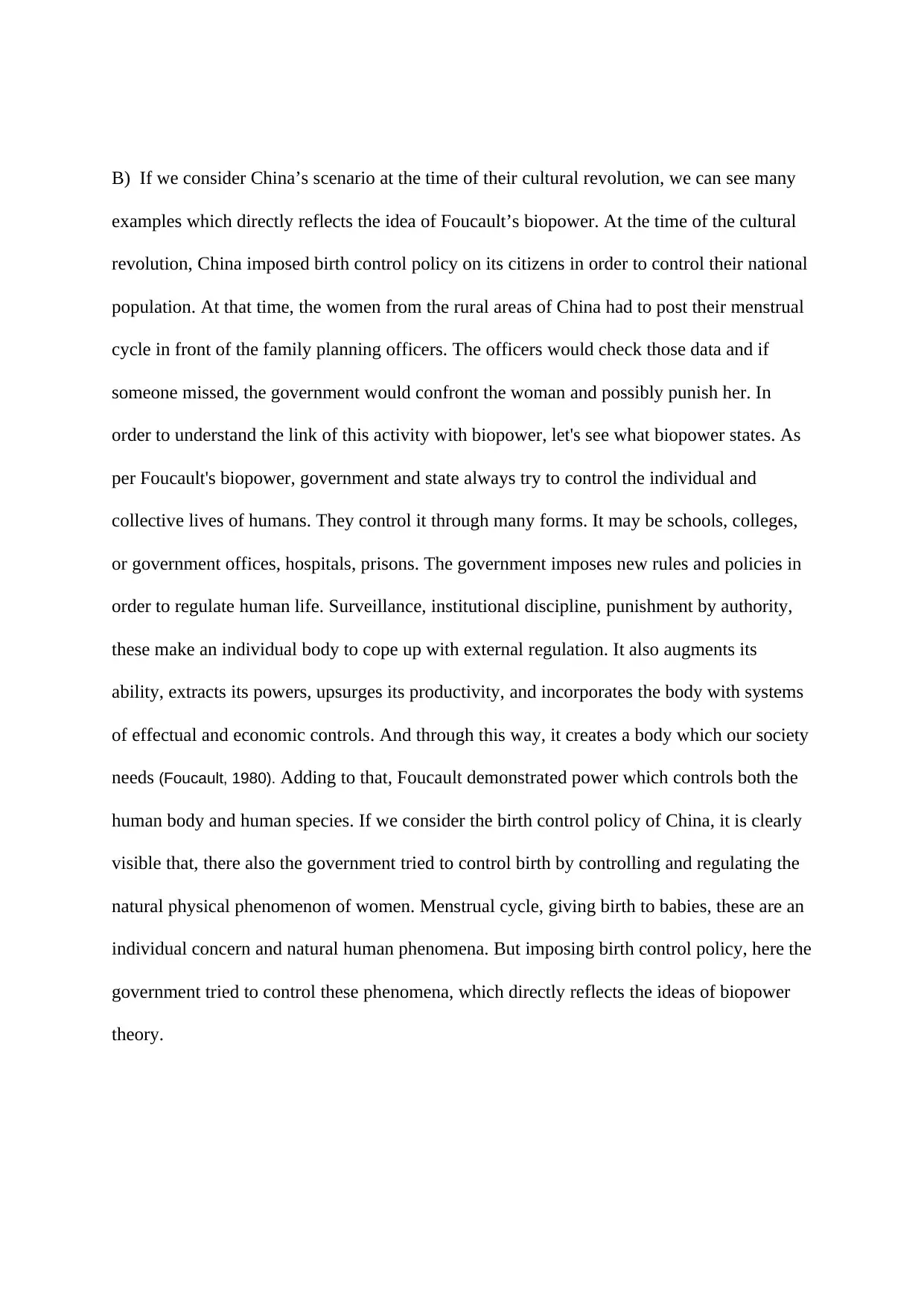
B) If we consider China’s scenario at the time of their cultural revolution, we can see many
examples which directly reflects the idea of Foucault’s biopower. At the time of the cultural
revolution, China imposed birth control policy on its citizens in order to control their national
population. At that time, the women from the rural areas of China had to post their menstrual
cycle in front of the family planning officers. The officers would check those data and if
someone missed, the government would confront the woman and possibly punish her. In
order to understand the link of this activity with biopower, let's see what biopower states. As
per Foucault's biopower, government and state always try to control the individual and
collective lives of humans. They control it through many forms. It may be schools, colleges,
or government offices, hospitals, prisons. The government imposes new rules and policies in
order to regulate human life. Surveillance, institutional discipline, punishment by authority,
these make an individual body to cope up with external regulation. It also augments its
ability, extracts its powers, upsurges its productivity, and incorporates the body with systems
of effectual and economic controls. And through this way, it creates a body which our society
needs (Foucault, 1980). Adding to that, Foucault demonstrated power which controls both the
human body and human species. If we consider the birth control policy of China, it is clearly
visible that, there also the government tried to control birth by controlling and regulating the
natural physical phenomenon of women. Menstrual cycle, giving birth to babies, these are an
individual concern and natural human phenomena. But imposing birth control policy, here the
government tried to control these phenomena, which directly reflects the ideas of biopower
theory.
examples which directly reflects the idea of Foucault’s biopower. At the time of the cultural
revolution, China imposed birth control policy on its citizens in order to control their national
population. At that time, the women from the rural areas of China had to post their menstrual
cycle in front of the family planning officers. The officers would check those data and if
someone missed, the government would confront the woman and possibly punish her. In
order to understand the link of this activity with biopower, let's see what biopower states. As
per Foucault's biopower, government and state always try to control the individual and
collective lives of humans. They control it through many forms. It may be schools, colleges,
or government offices, hospitals, prisons. The government imposes new rules and policies in
order to regulate human life. Surveillance, institutional discipline, punishment by authority,
these make an individual body to cope up with external regulation. It also augments its
ability, extracts its powers, upsurges its productivity, and incorporates the body with systems
of effectual and economic controls. And through this way, it creates a body which our society
needs (Foucault, 1980). Adding to that, Foucault demonstrated power which controls both the
human body and human species. If we consider the birth control policy of China, it is clearly
visible that, there also the government tried to control birth by controlling and regulating the
natural physical phenomenon of women. Menstrual cycle, giving birth to babies, these are an
individual concern and natural human phenomena. But imposing birth control policy, here the
government tried to control these phenomena, which directly reflects the ideas of biopower
theory.
⊘ This is a preview!⊘
Do you want full access?
Subscribe today to unlock all pages.

Trusted by 1+ million students worldwide
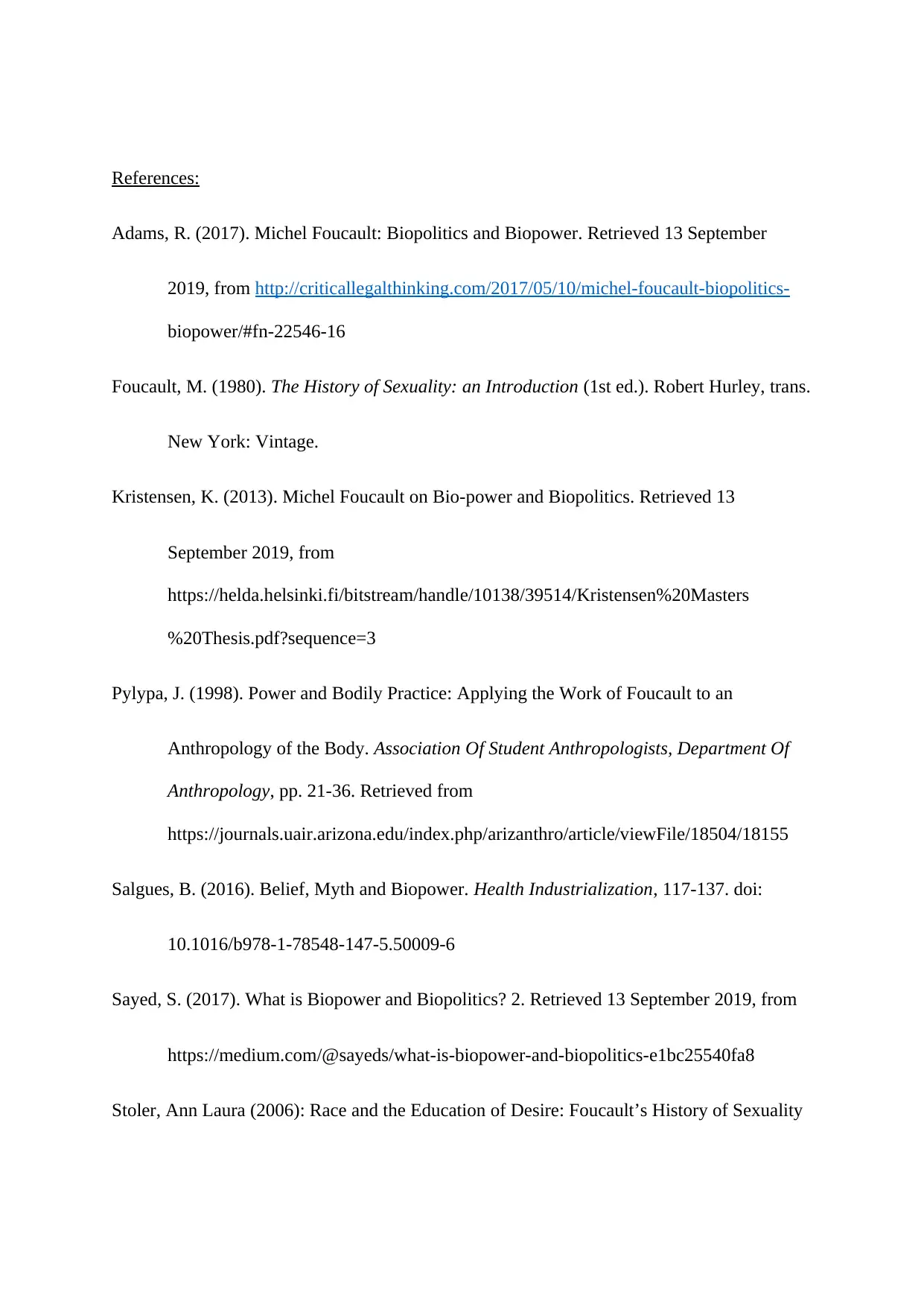
References:
Adams, R. (2017). Michel Foucault: Biopolitics and Biopower. Retrieved 13 September
2019, from http://criticallegalthinking.com/2017/05/10/michel-foucault-biopolitics-
biopower/#fn-22546-16
Foucault, M. (1980). The History of Sexuality: an Introduction (1st ed.). Robert Hurley, trans.
New York: Vintage.
Kristensen, K. (2013). Michel Foucault on Bio-power and Biopolitics. Retrieved 13
September 2019, from
https://helda.helsinki.fi/bitstream/handle/10138/39514/Kristensen%20Masters
%20Thesis.pdf?sequence=3
Pylypa, J. (1998). Power and Bodily Practice: Applying the Work of Foucault to an
Anthropology of the Body. Association Of Student Anthropologists, Department Of
Anthropology, pp. 21-36. Retrieved from
https://journals.uair.arizona.edu/index.php/arizanthro/article/viewFile/18504/18155
Salgues, B. (2016). Belief, Myth and Biopower. Health Industrialization, 117-137. doi:
10.1016/b978-1-78548-147-5.50009-6
Sayed, S. (2017). What is Biopower and Biopolitics? 2. Retrieved 13 September 2019, from
https://medium.com/@sayeds/what-is-biopower-and-biopolitics-e1bc25540fa8
Stoler, Ann Laura (2006): Race and the Education of Desire: Foucault’s History of Sexuality
Adams, R. (2017). Michel Foucault: Biopolitics and Biopower. Retrieved 13 September
2019, from http://criticallegalthinking.com/2017/05/10/michel-foucault-biopolitics-
biopower/#fn-22546-16
Foucault, M. (1980). The History of Sexuality: an Introduction (1st ed.). Robert Hurley, trans.
New York: Vintage.
Kristensen, K. (2013). Michel Foucault on Bio-power and Biopolitics. Retrieved 13
September 2019, from
https://helda.helsinki.fi/bitstream/handle/10138/39514/Kristensen%20Masters
%20Thesis.pdf?sequence=3
Pylypa, J. (1998). Power and Bodily Practice: Applying the Work of Foucault to an
Anthropology of the Body. Association Of Student Anthropologists, Department Of
Anthropology, pp. 21-36. Retrieved from
https://journals.uair.arizona.edu/index.php/arizanthro/article/viewFile/18504/18155
Salgues, B. (2016). Belief, Myth and Biopower. Health Industrialization, 117-137. doi:
10.1016/b978-1-78548-147-5.50009-6
Sayed, S. (2017). What is Biopower and Biopolitics? 2. Retrieved 13 September 2019, from
https://medium.com/@sayeds/what-is-biopower-and-biopolitics-e1bc25540fa8
Stoler, Ann Laura (2006): Race and the Education of Desire: Foucault’s History of Sexuality
Paraphrase This Document
Need a fresh take? Get an instant paraphrase of this document with our AI Paraphraser
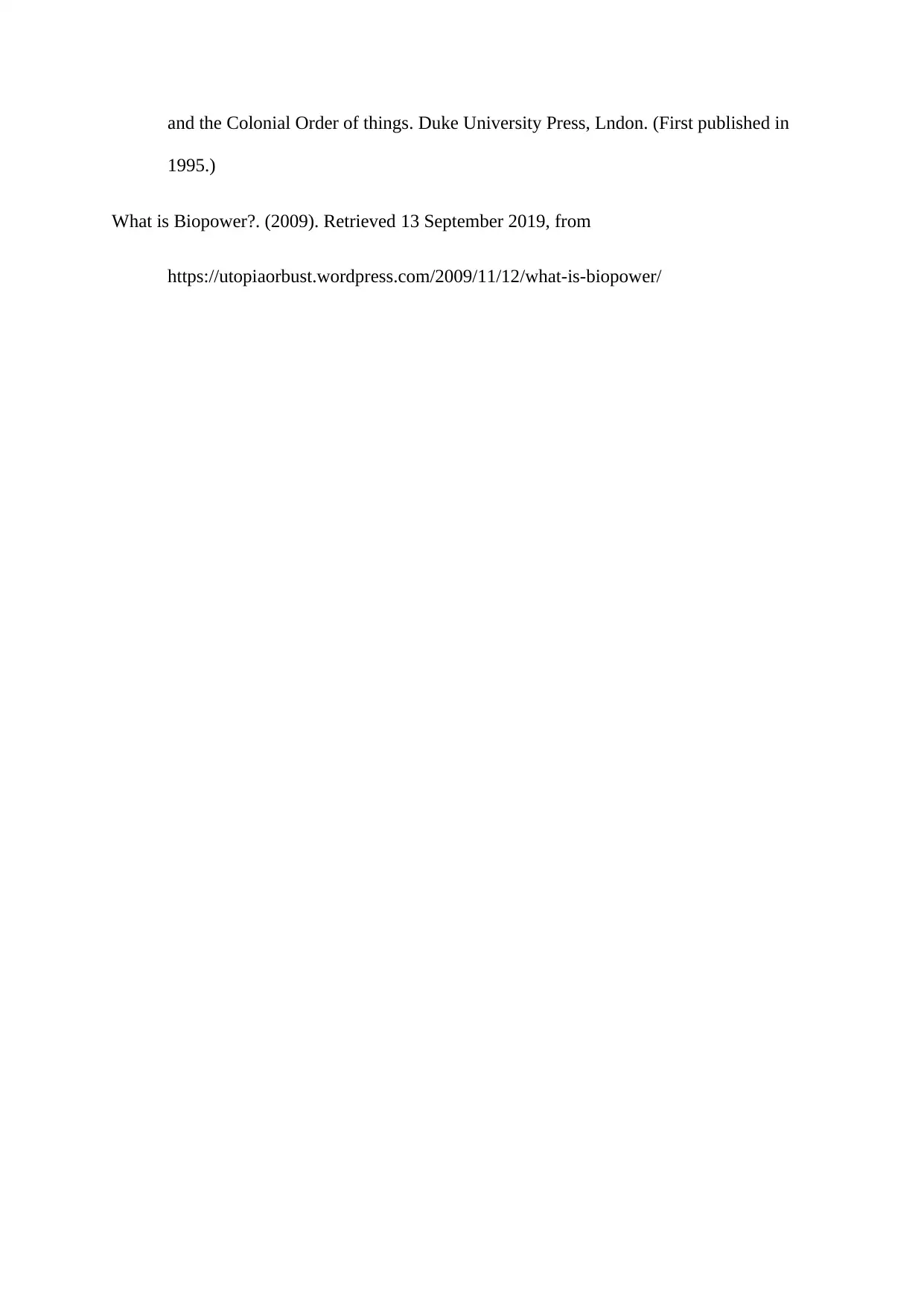
and the Colonial Order of things. Duke University Press, Lndon. (First published in
1995.)
What is Biopower?. (2009). Retrieved 13 September 2019, from
https://utopiaorbust.wordpress.com/2009/11/12/what-is-biopower/
1995.)
What is Biopower?. (2009). Retrieved 13 September 2019, from
https://utopiaorbust.wordpress.com/2009/11/12/what-is-biopower/
1 out of 5
Related Documents
Your All-in-One AI-Powered Toolkit for Academic Success.
+13062052269
info@desklib.com
Available 24*7 on WhatsApp / Email
![[object Object]](/_next/static/media/star-bottom.7253800d.svg)
Unlock your academic potential
Copyright © 2020–2026 A2Z Services. All Rights Reserved. Developed and managed by ZUCOL.





